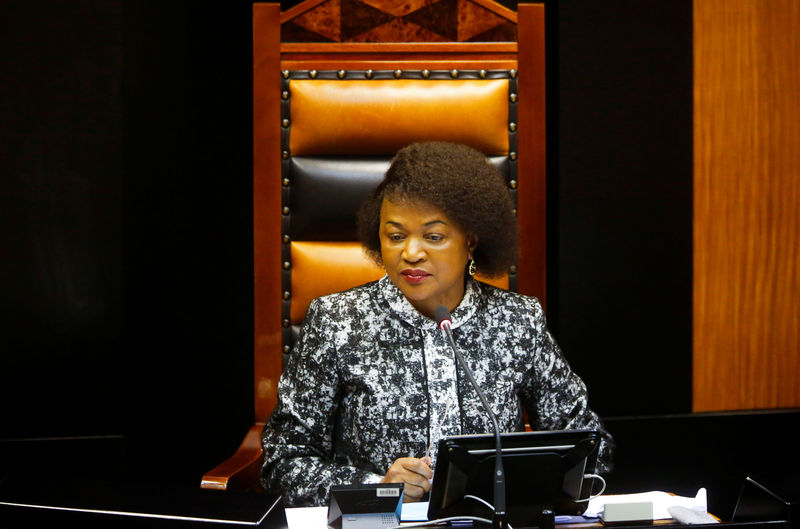By Wendell Roelf
CAPE TOWN (Reuters) - The speaker of South Africa's parliament ruled on Monday that a motion of no-confidence in President Jacob Zuma brought by opposition parties will be held through a secret ballot - a decision which increases the chances he will have to step down.
The decision could embolden members of the ruling African National Congress (ANC) to vote against Zuma and puts him in a precarious position as he struggles to fend off opposition accusations of corruption and mismanaging the economy.
Parliament will vote on the motion on Tuesday and if it succeeds, Zuma, in power since 2009, and his entire cabinet would have to step down.
The rand strengthened against the dollar, bond yields fell and banking shares advanced after the announcement, encouraged by the increased prospect of Zuma's removal.
Zuma's sacking of respected finance minister Pravin Gordhan in March shook South African markets, undermining his authority and threatening to split the ANC which has governed since the end of apartheid in 1994. The economy slid into recession in March and was downgraded to "junk" status by two ratings agencies. Speaker Baleka Mbete, who is also the ANC national chairwoman, told a news conference that her decision was meant to ensure the outcome of the vote was credible.
"The speaker must do that without fear or favor," Mbete said in her speech. "This decision is about putting the resilience of our democratic institution to test."
ANC spokesman Zizi Kodwa said the party was not surprised by Mbete's decision and it supported it. The ANC has vowed to back Zuma in parliament.
"We have no doubt that this frivolous motion, which has been hyped up by opposition parties...will fail like many before it," Kodwa said in a statement.
The ANC has 249 seats in the 400-seat parliament and the opposition controls 151 seats, so it would take 50 ANC lawmakers backing the opposition to vote out Zuma and his cabinet.
The ANC said last week its lawmakers would have to be "bewitched" to vote for the no-confidence motion.
Eight previous such motions against Zuma have failed with the ANC backing the president, but they were all held through an open process.
Zuma's critics wanted the vote to be anonymous in the hope that it would encourage ANC lawmakers to support his removal by shielding them from pressure from other party members.
NO EXCUSE
The main opposition Democratic Alliance party urged ANC lawmakers to vote Zuma out.
"ANC MPs now have no excuse," DA leader Musi Maimane said.
ANC lawmakers appeared divided on the vote.
"Tomorrow is the beginnings of an opportunity," said one ANC lawmaker who declined to be named.
Another, who also declined to be named, said: "We are committed to defend our movement."
Zuma is due to quit as ANC leader in December. If he is forced to step down as South Africa's president, the speaker takes over and the National Assembly is expected to elect a new national leader within 30 days, in effect meaning the ANC would select the new president and government.
Some analysts said Zuma could still survive the vote.
"The skeptical view could be that they have consulted widely enough, the ANC whips, to know whether it really doesn't matter if they hold it in secret or open. Jacob Zuma is going to survive so they felt safe in saying go for it," NKC African Economics analyst Gary van Staden said.
Thousands of people took part in protest marches in April calling for Zuma, 75, to step down. The ANC on one hand, and the DA and civil society groups plan to rally on Tuesday outside the parliament in Cape Town during the vote.
Data released on Monday meanwhile showed South Africa's unemployment rate remained at a 14-year high of nearly 28 percent in the second quarter. The statistics agency said the country was in a "precarious position" of not creating enough jobs to make a dent in poverty.
